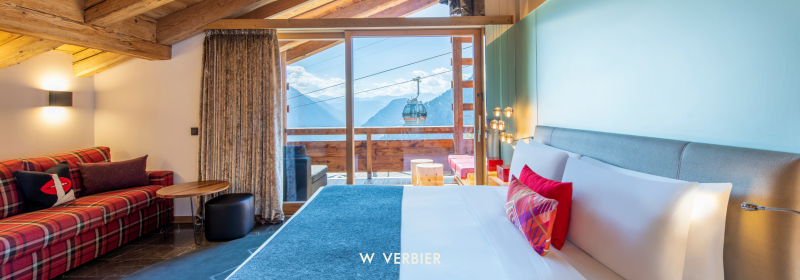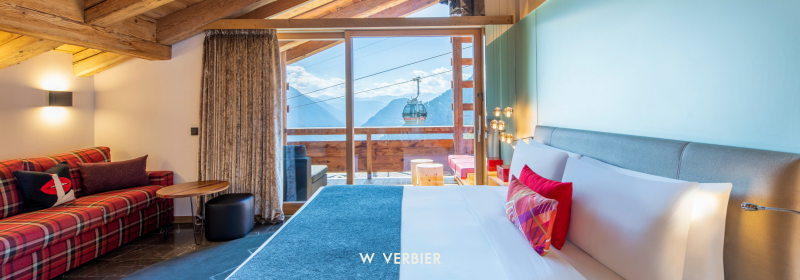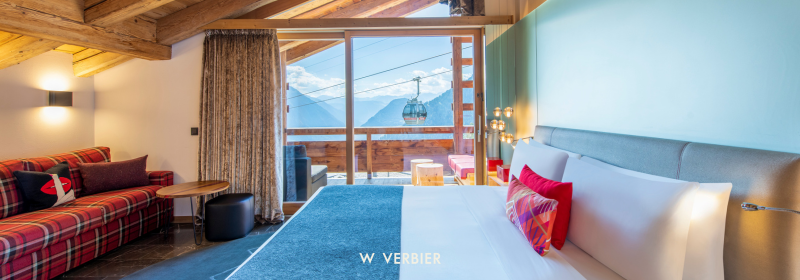
Target: Verbier
Interview with Simon Wiget
Simon Wiget is an outdoor sports enthusiast who’s been the Head Manager at Verbier Tourism for the past five years. He sat down with helvet to discuss his decisions, his skills and what he thinks of Verbier — which was voted the World’s Best Ski Resort in 2021 and 2022.
Simon Wiget, how would you define Verbier as a destination?
Ranging from 700 m in altitude in the Val de Bagnes to the eternal snowscapes of the Grand Combin massif at 4,314 m, from classical music to e-bikes, from the station’s memorable after-ski moments to the Haut Val’s wild forests, Verbier as a destination encompasses a diverse and contrasting range of activities. But its greatest assets are the topography, exceptional nature, altitude and expansive spread (410 km of slopes) of this fantastic playground, which includes the 4Vallées ski area, Mont Fort (3,300 m), and the freeride zones, which offer a truly unique ski experience. Verbier is an extremely dynamic and innovative destination, which makes it appealing in the summer as much as in the winter.
What are your primary target markets?
Our main market is Switzerland (primarily the Lake Geneva Regions), followed closely by England! After that, there’s Benelux, France and the Nordic countries. The American market (North America and Brazil) has been developing over the past few years, along with Italy. We were impacted by the strength of the Swiss franc, but we’re lucky that we attract a diverse clientele, which includes wealthier segments that were less affected by that situation. The pandemic also had a major impact, but our formerly favourable markets have mostly returned to their pre-pandemic levels, and the Swiss market has also grown, which is good news for us.
What proportion of tourism comes in the winter months versus the summer months?
Winter represents around 65% of our overnight stays but 80% of our total revenues. Our goal is to become a destination that thrives ten months out of the year and we’re investing heavily in summer development, notably through events and infrastructure improvements.
How have you seen Verbier evolve over the past five years?
Major underlying trends that were already underway pre-pandemic have only been reinforced, including a return to nature, a longing for wide open spaces and a desire for work flexibilization. These are all very positive for Verbier as it has numerous assets that correspond to these needs, starting with its vast protected territory (more than half of the municipality!). Additionally, more and more people are coming here to work, both regularly, by moving here, and occasionally. The development of international schools and numerous destination activities have also contributed to more families coming, while the flexibilization of the labour market means we can count on an increasing number of clients coming outside of school holiday periods. There’s no longer a slow phase in January, like there used to be!
What role does tourism play in the local economy?
The Val de Bagne’s local economy is heavily tourism-based. Tourism here generates a lot of activity and directly provides employment and a means for many people to live in this valley where, less than a century ago, life was very difficult. Tourism also has many indirect impacts, for example in the construction industry. And if our agricultural industry is thriving and bringing in higher revenues than in other places, that’s also because much of our local produce is consumed by tourists. If we have lots of people coming here throughout the year, that’s because tourist-driven activities are attractive and draw people to the area.
What are your personal feelings after five years at the head of Verbier Tourism?
From a personal point of view, I feel very privileged to be able to contribute to the evolution of such a dynamic destination, which has really managed to reconcile its international renown with its mountain values. My first missions were to create a unique tourism entity (with Verbier Tourism SA coming to life in May 2023) and to reinforce connections with and between the various key players in our tourism industry. We succeeded in creating an efficient working tool and a beautiful overall dynamic. It’s collaborative work that requires a lot of people being involved. The creation of the Tourism Master Plan was also a major milestone, which allows us to define a common goal that’s now our overarching objective.
Does your love of sports influence your approach?
Of course! Sports are one of our primary axes of development. The fact that I’ve been a professional in snowboarding, paragliding and canyoning, and have been an event organizer for over a decade, has really given me precious insights and an understanding of the field.
What’s the tourism strategy for the years to come? What main areas does Verbier still have to develop?
The vision defined in the Tourism Master Plan — which was based on numerous participatory workshops, surveys and meetings — is for Verbier to become “a sustainable 4-season mountain destination of reference”. We’ve built a programme that pushes us to become one of the best, to innovate and to make sustainability the cornerstone of what we do. We are lucky to already have a thriving economy and strong, well-developed social standards. Now, we need to place more importance and resources towards developing the environmental pillar of who we are. We have room to improve in that regard, and numerous actions have already been undertaken that we want to maximise. Verbier Tourism has already been labelled “Swisstainable” (Swiss Tourism’s sustainability designation) and our goal is to become a “Swisstainable Destination”. We have many projects that are already in the works and many more that are still to come. One of the biggest projects is developing affordable lodging solutions for families, young people and seasonal workers, for example.
What comes next after having already won the coveted “World’s Best Ski Station” award?
We certainly can’t rest on our laurels, because despite the importance of that designation, it is really just a marketing award. Our competitors are always innovating and developing. So, in order for us to stay competitive — and ideally to be among the best — we also constantly have to be striving for more and making improvements.

















